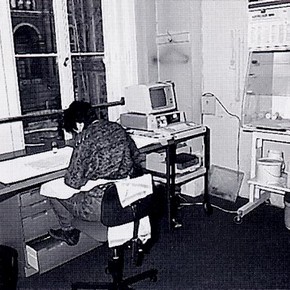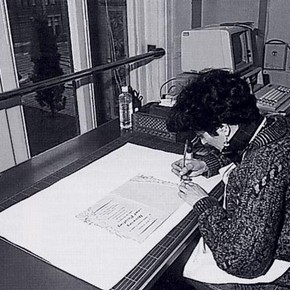Conservation Journal
January 1995 Issue 14
The role of the 'barefoot' conservator
In December 1988 I was brought into the Museum on contract to work on a collection of 450 scrapbooks belonging to the Theatre Museum, which were in need of basic refurbishment and 'phase' boxing. 'Phase' boxes are simple boxes made from an archival quality laminated acid-free box board and are regarded as the first phase or stage in a book's conservation treatment. The boxing studio had been set up in a panelled-off area in the North Court of the V&A. In 1990 my workshop in the 'stockade' of the North Court was requisitioned for refurbishment into what is now part of the exhibition space. As a result of this the phase boxing programme was suspended and a decision made to relocate me. At this time the National Art Library (NAL) fortuitously made an office in the West Room of the Library available to Book Conservation, so the position of 'barefoot' conservator was created in order to make use of this opportune space.
The expression 'barefoot' conservator was taken from the Chinese 'barefoot' doctor: a paramedical doctor working with basic medical training, and going from village to village. The term had already been applied to the two paper conservators working in the Print Room of the Prints, Drawings and Paintings Collection. My brief was to fulfil the same role but substituting books for people (though I would stress that my conservation knowledge was more than basic having gained the BTEC National Diploma and Higher Diploma in Library and Archive Conservation at Camberwell School of Art and Crafts).
However, the concept of the post was entirely new to the section and therefore experimental. In reality there were two roles: one as the barefoot conservator and the other as an intermediary to liaise between the main Book Conservation studio and the NAL. It was to be the first time that Book Conservation would have a presence within the Library.
Initially my studio was equipped with the essential necessities for carrying out basic refurbishment and small repairs to books - including small tears, reattaching endleaves and damaged and detached spines, and making simple enclosures - as well as advising on whether further conservation work was required. As time proceeded more equipment was purchased and, as my confidence grew in defining and identifying what was required within the NAL, and the best management of resources available, I began to expand the work to encompass the full repair, rebinding and rebacking of paper - and cloth - covered books, interspersed with the simpler repairs and enclosures mentioned previously. A year later the boxing programme was reinstated at Blythe House (an outstation of the V&A) enabling me to work in the boxing studio approximately once a week. The envisaged workload target to achieve per annum was around 550-400 objects, a target that with the phase boxing I was able to attain.
During this time, my knowledge of the collections in the NAL, increased understanding of how the library works and the staff's day-to-day problems, such as shortage of shelving and inadequate storage for vulnerable objects, has enabled me to build up a better comprehension of what the library staff seek from Book Conservation. This in turn gives some idea of what conservation work the section can and cannot do with the facilities and staff available. Between us we have devised various systems of prioritising books in order to make the most of our resources, given the enormous demands.The number of items worked on as the 'barefoot' conservator has enabled me to become familiar with the material in the collection, to see the condition of many of the objects on the shelves and to get to know their locations, whilst going through the stacks in search of material prioritised through the Preservation Action Sheets completed by NAL staff. Working within the NAL has been of extreme benefit to me and I value the experiences I have gained by having such a close working contact with our main client. NAL staff have frequently told me how greatly they appreciate having a book conservation presence on site. Staff can 'pop-in' to have simple queries answered, taking pressure off the necessity for someone to travel down to or come up from the main studio, and small jobs can be dealt with quickly, often preventing further damage as with, for example, small tears that may 'grow' through reader usage. The NAL is a last-resort reference library, meaning that readers are encouraged to try alternative sources for their research; therefore all efforts must be made to keep books accessible.
January 1995 Issue 14
- Editorial
- Ceremonial hat for eating Bouillabaisse: Eileen Agar 1936
- Measuring pollution in the museum environment
- The tail of the tiger: conservation of a pichhwai fragment
- The role of the 'barefoot' conservator
- Review: polymers in museums
- Review: 'New Horizons': the designer bookbinders' conference
- Review: the annual conference of the association for historical and fine art photographers
- RCA/ V&A new students for the academic year 1994/95

